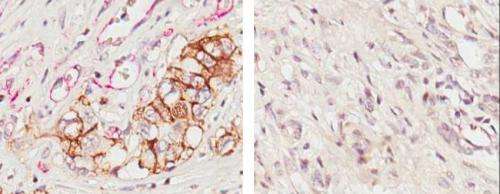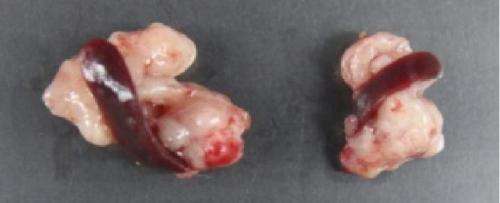High expression levels of IL-17B and its receptor (brown) in pancreatic cancer (left) compared with normal tissue (right). Credit: Wu et al., 2015
Pancreatic cancer and its metastases might have their days numbered, according to a study published in The Journal of Experimental Medicine.
Despite substantial progress in treating pancreatic cancer, this disease is still considered largely incurable. The poor prognosis is mostly due to metastases to other vital organs, a process driven by soluble factors present in the tumor environment.
A secreted immune protein called interleukin(IL)-17 has been associated with cancer progression, and receptors for IL-17 are expressed in the pancreas. Wen-Hwa Lee and colleagues from the Academia Sinica in Taiwan now show that one type of IL-17 (IL-17B) and its receptor are highly expressed in pancreatic cancer, and their levels correlate with poor patient survival. In mice, secretion of IL-17B promoted the growth and metastasis of pancreatic cancer cells and enhanced the recruitment of inflammatory cells to the tumor site. Treating tumor-bearing mice with a drug that prevented IL-17B from binding to its receptor halted tumor growth and spread, resulting in increased survival.
Since metastases are the leading cause of death in pancreatic cancer patients, this drug might represent a novel therapeutic approach to defeat pancreatic cancer and prolong patient survival.
Tumor growth and metastasis have been blocked in mice 28 days after treatment with a drug that prevents IL-17B from binding to its receptor (right) compared with untreated mice (left). Credit: Wu et al., 2015
More information: Wu, H.-H., et al. 2015. J. Exp. Med. DOI: 10.1084/jem.20141702
Journal information: Journal of Experimental Medicine
Provided by Rockefeller University Press






















